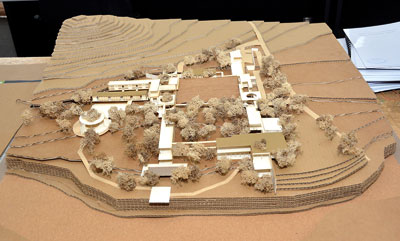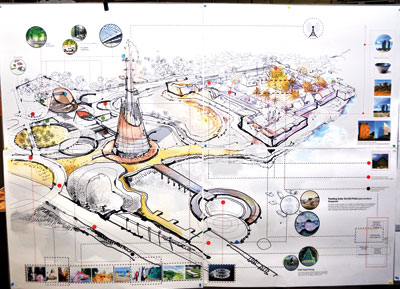Presenting The Future Architects- nurtured by City School of Architecture
View(s):
“Architecture is the learned game, correct and magnificent, of forms assembled in the light.”
Le Corbusier has the right grasp of the concept, for it is evident that these young minds have learned the game, and went a step further to prove that what was learned was mastered; all through the platform laid out by City School of Architecture.
The recently held Architectural Exhibition for their visiting partners the university of the West of England during their annual academic audit showcased the creativity of the students of the iconic school. The exhibition was not a mere attraction of the ‘big guns’. It gave a glimpse of the student’s progression throughout the years, with exhibits showcasing great designs created by students from the first year, till the final.
Year 1- Where it all Starts
The maiden project for first years was to design signature Diya Lamps. Afterwards, they upgraded onto ‘Collapsible Lamps’. Thereafter the students were exposed to Anthropometry and Ergonomics by creating their own signature play frames. Ultimately, students enter into proper architecture by designing an attractive garden pavilion. Next, the students were given the task to create a magnificent bridge using plastic straws while being cautious on the manner a bridge would react to tension and compression.
A small house, equipped with a guest room, servant area and proper living conditions was the next project, under strict specifications and a proper grid. These creations are astonishing, bearing in mind that these students are simply easing into the world of architecture.

Year 2- The Transition
The transition is evident, since the students are clearly updated on the context of the core teachings of architecture. The context selected was to analyze spaces under flyover bridges. Creations on display was created through the results of the analysis. This was the first push given to pursue technical designs. There is a significant improvement, when considering the first and last projects. Second project required the students to design a unique building or a complex. An awareness centre in Koggala was designed by the students. This was a conservation, and an awareness project.
Next, the students were introduced into the design & manufacture centres for 3 interesting crafts; elephant costume, ‘sesath’, and Kandyan dance costume designs. The third project is to create a pavilion at the architect exhibition. One design which was created purely out of plastic bottles left a lasting impact on the eyes of the beholders. The final project is to create a lodging for a family, which facilitate all the family members, achieving the perfect balance of the separation and unity.
Year 3- Progression
The first challenge is a sustainable design project. The final is a comprehensive design project. An office building was requested to be designed in Colombo, Nawala for the SDP. 2 options were given for the CDP; an upgrade to the current CSA premises with a golf academy or a School of Fashion.
Year 5 & 6- Continuation
These years covered urban design and social housing. 6th year focuses on conservation, sustainable, heritage and cultural projects and a multi-storied building. An entire project takes 3 months to complete. The designs should fit the context within Wanathamulla. Later they were assigned for individual housing projects.
6th years are tasked to design a ‘sustainable’ tower which highlights green initiatives. The students came up with sophisticated delivery building, with a virtual gallery and mechanisms which harness natural resources to produce energy. Next a culturally sensitive destination is given (Mannar Fort) and tasked students to fil it’s with creative construction which fits the requirement of the community. The results were a sight to behold.
Year 7- Signing Off in Style
The entire year is dedicated for a dissertation & a single project. It focuses on a comprehensive design project, much more complicated than the one done in the previous year. Establishments like rehabilitation centres, mental treatment complexes and upgrades to the Colombo Fort were made by the students. Throughout the years, students have kept their personal port-folios; collections of the designs that they came up with.
Upon inspection, the enhancement in the quality of talent is evident, for the design elements, and attention to detail kept on improving. Once the journey is at the end, students sign off, as potential candidates to sit the professional practice examination held by the Sri Lanka Institute of Architects to become fully fledged architects, ready to dazzle the world with their creative intellect.
During the course the students accumulate four qualifications at the Part-I level and four qualifications at the Part-II with includes two local qualifications & Degree from the University of the West of England (UWE) and professional membership to the Royal Institute of British Architects (RIBA).
www.csacolombo.edu.lk
0774596632
Randheer Mallawaarachchi


